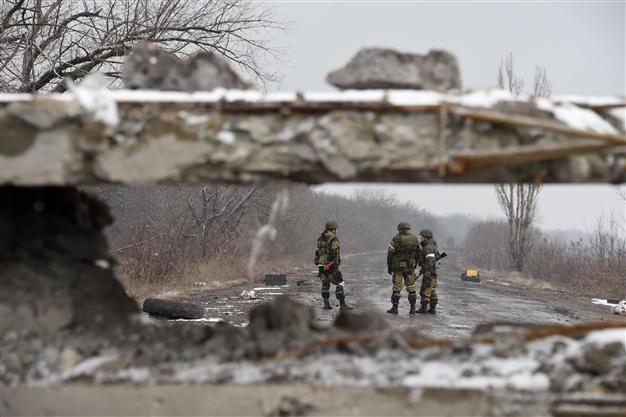Ukraine peace talks down to wire as fighting rages
KYIV - Agence France-Presse

Pro-Russian separatist fighters stand on February 9, 2015 on a road near Uglegorsk, 6 kms southwest of Debaltseve. AFP Photo
Diplomats scrambled on Feb. 10 to finalise a peace deal for war-torn Ukraine ahead of a crunch summit in Minsk, with the warring sides pushing to gain ground ahead of any truce.
Fighting in the east killed at least 12 people, including seven Ukrainian troops, as pro-Russia rebels sought to encircle railway hub Deblatseve, and Ukrainian forces launched a counter-offensive around the strategic port of Mariupol.
Ukrainian forces took control of three villages east of Mariupol, around 90 kilometres south of rebel stronghold Donetsk, and fierce fighting was going on for control of two more, senior interior ministry advisor Zoryan Shkiryak said.
Rebels, diplomats and mediators gathered in the Belarussian capital to bridge gaps on a possible peace deal, which the leaders of Ukraine, Russia, France and Germany hope to come and sign in Minsk on Wednesday.
Rebel negotiator Denis Pushilin told the separatists' news agency that he was heading to Minsk for talks with mediators from the Organization for Security and Co-operation in Europe (OSCE) as well as Russian and Ukrainian representatives.
French President Francois Hollande and German Chancellor Angela Merkel have been conducting frantic diplomacy, taking the "last chance" deal to Ukrainian President Petro Poroshenko and Russian leader Vladimir Putin.
Merkel then headed to Washington for lengthy talks with the US President Barack Obama Monday on the peace plan to defuse fighting that has killed at least 5,400 people since April.
Obama agreed to hold off on sending arms to Ukraine until truce efforts have played out, voicing hope that a deal could be reached to end the 10-month conflict on the eastern edge of Europe.
Proponents of sending arms to Ukrainian forces argue Kiev needs the weapons to counter what they say is a flow of arms and troops by Russia. Moscow denies arming the rebels.
Merkel has opposed sending arms, warning it would further escalate a war that Ukraine cannot win against the better equipped pro-Russian forces, but some in the West feel hi-tech weapons could at least make the conflict more costly and painful for Russia.
Merkel acknowledged that a drive to get Putin to put his name to a deal may not succeed.
"We have no guarantee," she said in Washington.
"I cannot give you a guarantee for the outcome of the Wednesday talks and maybe nothing will come out of it."
Ahead of the Minsk summit, the European Union decided to hold off implementing new sanctions against Russia, giving space for talks.
EU foreign ministers had been set to formally sign off on adding 19 more people to a sanctions list over Moscow's backing of the separatists.
Putin has warned that a "number of points" still needed to be agreed before the Minsk meeting can take place.
Based on a largely ignored peace deal agreed in September in Minsk, the new plan may extend rebel control over territory seized in recent weeks, around 500 square kilometres (around 200 square miles), although Kiev is adamant the demarcation line agreed in September should not be shifted.
Hollande has said the proposal includes the creation of a 50 to 70-kilometre (31 to 44-mile) demilitarised zone around the current frontline.
"Eight days ago, they (Ukraine and Russia) weren't talking to each other. Now, they've sat at the same table," a French diplomatic source said, describing negotiations as "very complicated".
Russia wants the rebel areas to become a federation or have autonomy, with elected leaders, something Kiev rejects because it would require a change to the constitution.
Kiev is also demanding it retake control of the roughly 400-kilometre border between separatist Ukraine and Russia.
The deployment of peacekeepers is also being discussed if a deal is reached, but there is so far no agreement on their nationality.
"If we accept armed Russians as part of the force, you're de facto legitimising the presence of their troops on our soil," a Ukrainian diplomatic source said.
Kiev and the European leaders also want the immediate withdrawal of heavy weaponry as part of any deal, while rebels want elections first.
"Simply declaring a ceasefire isn't enough, you must have the immediate withdrawal of weapons otherwise the two armies will quickly end up firing at each other again," the French diplomatic source said.
